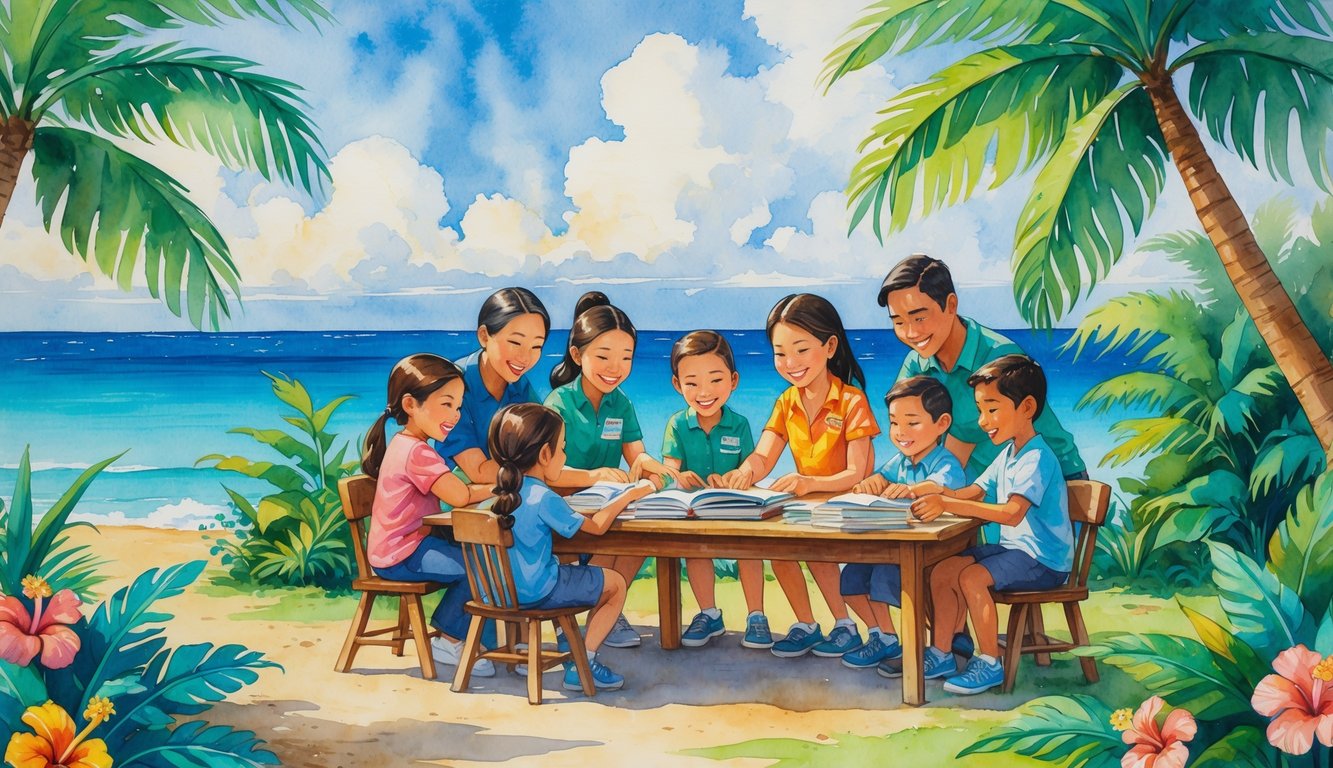Living in Hawaii, I’ve found that volunteering as a tutor is one of the best ways I can support students and adults in my community.

Anyone can become a volunteer tutor by applying with local organizations that offer tutoring and mentoring opportunities throughout the islands.
Whether I want to help kids with reading, homework, or basic skills, I have many ways to get involved.

I volunteer as a tutor in Hawaii by working with groups like Hawaii Literacy, which connects tutors with adults and children who need help learning to read and write.
Some programs offer training and resources to help me make a positive impact.
Volunteering lets me make a difference and build new connections.
Helping others learn supports the people I tutor and helps me grow and learn new things.
If I want to give back to the Hawaii community and help someone reach their goals, becoming a volunteer tutor is a great place to start.
Why Volunteer as a Tutor in Hawaii
When I volunteer as a tutor in Hawaii, I make a direct difference in students’ lives.
I also grow as a person and help support local education.
These actions help students succeed while giving me valuable personal rewards.
Impact on Students and Community
When I give my time as a volunteer tutor, I support students who may struggle with their classes.
By explaining math problems or helping with reading, I watch them gain confidence and improve their grades.
Students who get extra help often participate more in class and catch up with their peers.
Some learn new ways to study and solve problems, which makes learning easier for them.
This benefits the community because better-educated students are more likely to succeed and contribute in the future.
My actions sometimes inspire others to get involved too.
This creates a friendly environment where everyone wants to help others grow.
Personal Development Benefits
As a volunteer tutor, I develop skills like communication, problem-solving, and patience.
I explain ideas in different ways until my student understands, which helps me become a better listener and teacher.
Each tutoring session gives me a chance to practice leadership and teamwork.
I meet people from different backgrounds and learn more about their experiences.
This helps me become more understanding and aware of the needs around me.
By tutoring, I also gain confidence in my own abilities.
Some groups offer training or workshops to build skills that I can use in other areas of my life.
Supporting Local Education Initiatives
Hawaii offers programs and initiatives to support students who need extra help.
When I sign up as a volunteer tutor, I join these efforts to help every student succeed.
Many programs focus on reading, writing, and math.
By volunteering consistently, I help these programs reach more students and meet their goals.
Giving back to Hawaii’s education system helps me form strong connections with my community.
I help ensure students have the support they need to move forward in their education.
Types of Tutoring Volunteer Opportunities

I can help as a volunteer tutor in Hawaii in many ways.
Options include working with children after school, helping adults with literacy, mentoring young people, and joining special community events.
After-School Programs
I work with kids in after-school settings, where they may need help with homework, reading, or basic math.
Libraries often have programs aimed at boosting children’s reading and language skills.
Some organizations, like Hawaii Literacy, let me serve at their Family Libraries or bookmobile.
I offer tutoring support and book lending for children of all ages.
These programs usually happen on weekdays, with flexible hours for volunteers.
As a tutor, I may use games, reading circles, or one-on-one sessions to help children.
I might also join workshops that encourage a love of books and learning.
By helping students after school, I give them the support they need to do better in class.
Adult and Family Literacy
If I want to help adults or families, I can find opportunities to help parents or other adults improve their reading, English, or financial skills.
Programs like Hawaii Literacy support adults learning language skills needed at work or home.
I might tutor one-on-one with adults, teach small group classes, or help with digital literacy workshops.
These roles are great if I enjoy encouraging lifelong learning.
Training is usually provided, and sometimes I work with other tutors as part of a team.
Family literacy activities sometimes include both parents and children.
This lets me see families grow in their ability to read and learn together.
Peer Mentoring and Youth Programs
Peer mentoring lets me work as a role model for students close to my own age.
At UH Mānoa, I could join the Peer Mentor Ohana and work with groups or individuals to build academic and study skills.
Schools or youth groups often organize these programs.
As a mentor, I support fellow students in subjects like math, science, or writing, and help them gain confidence.
Peer programs teach leadership and communication skills and help build friendships.
Volunteer youth programs are a good way for me to give back if I am a student who wants to help others succeed.
Special Initiatives and Events
Sometimes, I join community events and short-term projects focused on literacy or education.
Examples include weekend reading festivals, training workshops, or special tutoring initiatives.
Organizations often hold special training sessions where I learn new tutoring skills.
Events may need extra volunteers to set up, guide learners, or help run activities for families and kids.
These opportunities are perfect if I have a busy schedule and want to try tutoring without a long-term commitment.
I can stay involved with the community and contribute even if I have only a few days each semester.
Where to Volunteer as a Tutor in Hawaii

I can help as a tutor in Hawaii in many ways.
Some groups need help with reading, others with homework, and some need support both online and in my local community.
Opportunities in Honolulu
In Honolulu, several organizations match volunteers with students who need tutoring.
Hawaii Literacy is a well-known group where I can help adults and children improve their reading skills.
Their office is on N Kukui Street, and I can call or email them to get started.
More information is on the Hawaii Literacy volunteer page.
The Learning Assistance Center at UH Manoa seeks tutors for both paid and volunteer positions.
As a student, I might tutor at the Academic Resource Center or join programs like Peer Mentor Ohana.
See details on the UH Manoa tutoring page.
Libraries in Honolulu offer more options.
The State Library System sometimes holds informal training sessions and lets me volunteer directly with literacy programs.
They often focus on helping adults who struggle with reading.
Event info and sign-ups are on the public library website.
Places to Volunteer in Oahu
All around Oahu, many local groups and nonprofits invite me to share my skills.
For example, HOPE Tutoring looks for volunteers aged 16 and up and offers training on Zoom.
I need to commit to at least one hour per week for a semester and pass a background check.
Details and the interest form are on the HOPE Tutoring volunteer site.
Family support programs like the Ronald McDonald House Charities of Hawaii also need volunteers.
I can help with tutoring or assist families with schoolwork.
Some roles are not focused only on tutoring, but I can help in areas from homework to enrichment activities.
The RMHC-HI website lists all their current needs.
On Oahu, public libraries and community centers offer reading help and homework clubs.
I can check with my local library to find out about regular and seasonal volunteer tutor programs.
Kauai and Neighbor Islands
On Kauai and other islands like Maui and the Big Island, I can help through smaller community groups, libraries, and schools.
These places welcome extra help, especially where there may not be as many regular tutors.
Some groups, such as county libraries or local literacy projects, run programs for both kids and adults.
I usually join by contacting the local library or checking flyers and announcements about workshops.
In small communities, schools often know how I can get involved, sometimes with after-school programs that welcome volunteers.
Volunteer work in rural areas might mean traveling to different towns or combining online and in-person help.
Flexible scheduling is common because many programs depend on volunteer availability.
Virtual and Community-Based Tutoring
If I prefer to volunteer from home, virtual tutoring options are growing in Hawaii.
Some groups arrange tutoring sessions over Zoom or similar platforms, matching me with students from any island.
HOPE Tutoring and other organizations offer online orientation and training, making it easy to get started.
Community-based efforts, like neighborhood learning circles and small group study sessions, are another way to make a local impact.
I might join through my church, community center, or as a private tutor organized by local parents.
With online and community-based volunteering, I can tutor in reading, math, language, or other needed subjects.
I can usually choose the age group and time commitment that suits me best.
This helps balance my schedule and interests.
How to Get Started as a Volunteer Tutor

When I started as a volunteer tutor in Hawaii, I followed a few key steps.
I found a good organization, learned about the application process, passed a background check, and attended training.
Finding the Right Organization
I started by researching organizations in Hawaii that focus on education and literacy. Groups like Hawaii Literacy and local community centers often need help.
National programs such as Learn To Be, STEM·E Youth Career Development Program, and Schoolhouse.world also offer remote tutoring opportunities, including for Hawaii students.
I looked at each group’s mission and the people they serve. Some focus on kids who need extra reading help, while others support adults learning English.
I read reviews and checked if the program coordinator responds quickly to questions. To stay organized, I made a table comparing programs, age groups, and whether sessions are online or in-person.
This helped me find the best fit for my skills and schedule.
Application Process
After choosing an organization, I filled out the application form online. These forms ask for my name, contact details, and any experience I have with teaching or helping others.
Sometimes, they ask about my favorite subjects or the grades I want to tutor. I apply carefully so the coordinator can match me with the right students.
Many groups let me create a schedule that fits my life, like Learn To Be, which values flexibility. Some organizations need references, so I made a short list of people who can speak about my skills and character.
After applying, I waited for a reply with next steps, such as a short interview.
Background Check and Screening
Most organizations in Hawaii require volunteers to pass a background check. This helps keep students safe.
Usually, I fill out a separate online form and give permission for them to check my records. Sometimes they ask for my Social Security number or government ID.
The background check may look at criminal records and past employment, but it does not take long. If I have concerns, I contact the program coordinator for more details.
Some places also ask about my driving record if I tutor in person. This extra step helps everyone feel safe and supported.
Orientation and Training
After I clear the background check, I attend a required orientation. Hawaii Literacy and other programs offer group training sessions, either online or in person.
Orientation covers program rules, how to plan tutoring sessions, and what to do if problems come up. Training sessions explain how to use lesson plans, give tips on managing group dynamics, and offer advice for helping shy or nervous students.
Some groups, like Literacy Works, have a 12-hour training for new tutors. I take notes, ask questions, and practice sample lessons so I feel ready to meet my first student.
This helps me feel confident and excited to get started.
Essential Skills for Volunteer Tutors
When I volunteer as a tutor in Hawaii, I learn that key skills matter as much as knowing the subject. Building strong communication, using technology, and understanding each learner’s needs all help me succeed as a tutor.
Communication and Public Speaking
Good communication helps me connect with learners from all backgrounds and ages. I explain ideas clearly and listen to questions with patience.
Public speaking is important, especially when I lead group lessons or help students share answers. Sometimes I use role-play or simple activities to practice new ideas with my students.
Using simple words and a calm voice keeps directions clear. I encourage shy learners to participate and share their thoughts.
Through regular feedback, I help students build confidence. If I struggle with a message, I try different ways to explain, like using pictures or writing things down.
Being a good communicator means staying flexible and ready to adapt to each learner’s needs. These skills come with practice and make a big difference.
Using Technology as a Tutor
Technology plays a big role in tutoring today. I use video calls, online worksheets, and learning apps to make sessions interactive.
Programs like Google Classroom or Zoom help me reach students who can’t attend in person. Some students already know how to use tablets or computers, while others need extra help.
I show learners and their families basic skills, such as setting up an email or joining an online class. Sharing free literacy resources online helps everyone keep learning outside of lessons.
I use digital tools to track progress and send reminders. By learning new technology, I support more students and make my tutoring more effective.
If I get stuck, I use tutorials and guides to improve.
Working With Children and Adults
Tutoring helps both kids and adults. Children and adults have different learning styles and goals.
For children, I use games, stories, and hands-on activities to keep lessons fun. When I work with adults, I focus on real-life needs, like reading work documents or helping with homework.
Patience is important because learning as an adult can feel stressful. I create a space where everyone feels safe to ask questions and make mistakes.
I change my approach based on who I am working with and always check how they are doing in each session.
Supporting Parents and Families
Families play a big part in a student’s success. I show parents simple ways to support their children’s learning at home.
This might include reading together, using flashcards, or talking about school each day. Sometimes, parents need advice on finding community resources for literacy or after-school programs.
I share these resources so the whole family can get involved. I listen to parents’ concerns and respect their culture and background.
I help parents learn about online tools so they can use technology with their children. When families work together, students feel more motivated and confident.
Safety and Volunteer Guidelines

Safety, trust, and respect are key to a good tutoring experience. By following policies and acting with care, I help create a positive, safe environment for everyone.
I check for health rules, behave ethically, and respond to people’s needs.
Maintaining a Safe Tutoring Environment
As a tutor, I create a space that is safe, inclusive, and supportive. I make sure the location is clean, well-lit, and free of hazards.
Since I may work with students of different ages, I stay alert to any signs of bullying or discomfort. I follow clear boundaries—no unnecessary physical contact, and I respect privacy.
The Hawaii Department of Education says that physical punishment and strip searches are strictly forbidden. I use force only to prevent harm, not for discipline.
I make myself available for questions or concerns and keep communication open. If I see something unsafe, I report it right away.
COVID-19 Protocols and Requirements
When I volunteer as a tutor, I follow current COVID-19 protocols. This includes wearing a mask indoors, washing my hands often, and staying home if I’m sick.
Many programs may ask for proof of vaccination or regular health screenings. Some tutoring, meetings, or training sessions are online to reduce face-to-face contact.
For example, HOPE Tutoring offers volunteer orientation sessions on Zoom. This helps keep volunteers and students safe.
If I tutor in person, I keep enough distance between myself and others. I check for updates from my organization, as rules can change based on Hawaii’s health situation.
Ethical Standards and Boundaries
I act with honesty and fairness. I treat every student with respect, no matter their background or learning style.
Personal information about students stays private. I do not discuss sensitive matters outside of tutoring sessions.
I keep healthy boundaries and avoid behavior that could be misunderstood or make someone uncomfortable. The Code of Conduct says tutors must keep professional distance and report any concerning behavior.
If a student shares serious issues, I follow my organization’s guidelines and notify the right people.
Additional Ways to Volunteer in Hawaii’s Education Community

I can make a difference in Hawaii’s education community in many ways. Even if I am not tutoring, I can support events or help younger students succeed.
Supporting Educational Events
I help at local school fairs, science nights, or literacy celebrations. Many schools need volunteers to guide students, share information with families, or set up and clean event spaces.
Serving as an event assistant means I may check in families, supervise stations, or help with registration. Some community groups and schools run ongoing programs like reading nights or math festivals, and I can help with planning and organizing.
Groups such as the Hawaii State Department of Education collect donations and welcome event volunteers. I can learn more about their opportunities from the official department website.
Mentorship and Leadership Roles
As a mentor or leader, I help students develop life skills beyond academics. I can join mentorship programs as a role model, guiding young people with advice on goal setting, teamwork, and study habits.
Program coordinators match volunteers with students who need extra support. I may help high school students prepare for college or offer advice to younger children.
These mentorship roles are available through local nonprofits and community initiatives, like reading clubs or leadership workshops. Taking a leadership role can mean working closely with teachers and staff to plan and lead enrichment activities.
Organizations to Explore for Tutoring and Volunteering

Hawaii offers many ways for me to get involved with tutoring and community service. I can find groups focused on literacy, seniors, health, and the environment.
Hawaii Literacy and Bookmobile
Hawaii Literacy gives me a chance to work directly with children and adults who need help with reading and writing. I can volunteer as a reading tutor in their Family Literacy Libraries or help adults learn English and basic skills.
The Hawaii Literacy Bookmobile brings books and reading help to underserved areas. As a Bookmobile volunteer, I might read books aloud, help with homework, or give out new books to keiki (kids).
Most roles ask for a steady commitment, such as a few hours each week. Training and support are provided for every volunteer.
Working with Hawaii Literacy means I help people build skills for school, work, and daily life.
Lanakila Meals on Wheels
Lanakila Meals on Wheels focuses on meal delivery, but I can also join education and outreach for kupuna (seniors). Some volunteers teach seniors simple digital literacy, like texting or making video calls, so they can stay connected with family.
Volunteer positions include one-time and ongoing roles. I may pack or deliver meals or spend time with seniors who feel lonely.
Sometimes, I help with group activities or holiday card projects for homebound kupuna. Lanakila Meals on Wheels gives me a chance to connect with elders and provide meaningful support in both nutrition and socialization.
Waikiki Health Center
Waikiki Health Center serves many in the community, from children to seniors. As a volunteer, I can help at youth or teen tutoring programs, organize health education workshops, or lead afterschool activities.
Some programs ask volunteers to help students with homework or reading skills, especially in community clinics or shelters. I might help with health fairs, literacy events, or lead an exercise class.
The center values volunteers who show up regularly and want to make a real impact. I have to complete training and a background check before starting.
Waikiki Health Center welcomes friendly, patient people who want to serve those in need.
Non-Education Volunteer Groups
Besides traditional tutoring, Hawaii offers other volunteer opportunities that support education and community growth in different ways. With Surfrider Foundation, I can teach kids and families about ocean conservation through hands-on beach cleanups.
The Honolulu Zoo Society lets me share animal facts with visiting students and help with tours or camps. Kupu offers youth programs that teach environmental leadership and service learning.
These roles might not always involve academic tutoring, but they foster skills, teamwork, and curiosity. Non-education groups give me creative, active ways to engage with local youth and families.
Tips for Succeeding as a Volunteer Tutor

To help students reach their full potential, I build trust, stay flexible, and keep learning. Understanding student needs helps me make real progress.
Building Positive Relationships
When I start working with a student, I learn their name and use it often. I treat each student with respect and listen carefully to what they say.
If they share about their day or interests, I show real interest too. This helps build trust.
I explain what I can help with and encourage students to set their own goals. If students feel comfortable, they’re more likely to ask for help and try new things.
I show up on time, keep promises, and follow through. Positive feedback, even for small wins, boosts confidence.
Adapting to Student Needs
Every student learns differently, so I pay attention to how they respond to different activities. If something isn’t working, I change my approach.
Some students do better when we break big tasks into smaller steps. Others need more visuals or hands-on practice.
I ask questions like, “Was that part clear?” or “Would you like to try it a different way?” I use worksheets, videos, and games to make learning more interesting.
Sometimes, students need extra time to understand something. I stay patient and never rush them.
If I’m not sure how to help with a subject, I look up new teaching strategies or ask other tutors for advice. Adaptability helps students succeed in their education journey.
Ongoing Learning and Development
To be an effective tutor, I join training sessions when I can. Many organizations offer free or low-cost tutor training programs that cover the basics and give helpful tips.
I read articles about education or join online groups for tutors. These activities help me stay updated on new teaching methods.
When students give feedback, I pay close attention. I use their input to make my sessions better.
I keep learning so I can help students more. This also helps me connect them with useful resources.




